- Home
- Diana Wynne Jones
The Homeward Bounders Page 7
The Homeward Bounders Read online
Page 7
“In that case,” said Helen, “how will it feel to go on living inside a whole village?”
“Shut up!” I said. “I don’t think they could. There’s this rule that something awful happens to people who harm Homeward Bounders. Rule Two.”
“Will that help us,” Helen said musingly, “if they decide to eat us a leg or an arm at a time?”
“Will you be quiet!” I said. “You are making me sick, and I don’t need your help for that at the moment! It’s not true. You’re guessing.”
“Then why are you so cross?” she said.
She had me there. I had to admit it. I thought she was right. It was creepy how glad they were to see us. And now the door was locked. “All right,” I said. “I’m sorry. I didn’t know what that sign meant. I’d never seen it before.”
“That’s what annoys me,” she said. “I was afraid you were a fool and now I know you are. I wouldn’t have bothered to bring you with me if I’d known. I’d be better off on my own.”
That took my breath away. The cheek! The cool cheek! “So you were just making use of me!” I snarled. “You and your elephant’s trunk!”
“Well, yes,” she said, as cool as a cucumber. “I was trying it out. I knew that a traverse casts in all directions, so that two or more people fly outwards from one another. Those were the words they taught it to me in, but it doesn’t feel like flying, does it? More like a twitch. And I thought that if two people were holding on to one another, then it was likely they’d go together. So I decided to hang on to you as soon as I saw you. I could see you didn’t belong in our world, so that meant you’d had some experience in exile. I thought you’d make a native guide for me. Instead, you get us both eaten. I wish I’d left you alone now.”
“I swear to you,” I said, “I’ve never been in a fix like this before. Ever. How do you come to know so much about the Bounds anyway?”
“From being brought up in the House of Uquar,” said Helen. “Because of my gift. I told you. When I was old enough, my word was to have run throughout the world. Now I shall have to wait until I can get back. It’s all Their fault! I shall find a way to make Them suffer for it too!”
“You really mustn’t talk about Them like that,” I said nervously. “I think They know.”
“I’m sure They do,” said Helen. “And They’re welcome to listen if They wish. I intend to talk about Them. You can put your fingers in your ears if you’re scared, but I’m going to tell you all the same.”
And tell me she did. After the way she’d said it, I’d have died rather than put my fingers in my ears and, anyway, I was too interested. My stomach suddenly went thinner a little after that. I squatted opposite her on the cushions and we talked half the night.
VI
Helen had been born with her right arm just a withered stump. Her mother was very sad about it, because in that world you don’t get far if you don’t have two hands. From my experience there, I’d say that if you happened to have an extra pair on top of that, you’d still only just be holding your own. It’s every man—or woman—for himself there. Life is a perpetual stalking ambush. You don’t go out shopping, you go out robbing—and then get robbed yourself on your way home with the robberies. And on top of that there are the dragon-things, snakes, tigers and savage great birds to peck you to death.
So Helen’s father was going to sling her out of their fort. A new baby wouldn’t have lasted five minutes outside, but he said it was kindest. Helen’s mother wept and cried and begged, and in the end she persuaded him to keep Helen for a six month’s trial as it were. And when Helen was four months old—you know, the sort of time when babies start holding up their hands and staring at them and going goo-ga at their fingers—Helen began holding up her left hand, because that was the only one she’d got. And she looked at it very seriously. Then she looked very seriously and carefully at her mother’s hands when her mother came to play goo-ga with her too. And the next time her mother came, Helen had a right arm, almost like an ordinary baby, except that, not having much to compare it with, she’d got the hand wrong. It was a left hand, with the thumb where the little finger should be. Her mother thought she was dreaming at first, and didn’t say anything, because there were still two months to go. And by the time Helen was six months old, she’d put the hand right and had a perfect pair of arms like an ordinary baby.
Helen’s father bore her a grudge for proving him wrong. People were like that in that world. In revenge, he sent off an armed messenger to the House of Uquar to ask if this was natural, or should he kill Helen out of hand, as it were?
The House of Uquar, as far as I could work out, was a sort of cross between a temple and a university and an army headquarters. It was the one place in the world nobody dared rob. And it was very much respected because—I think—Uquar was a sort of god. The people there got very excited and sent out an armored column to have a look at Helen. Helen said she remembered them, even though she was only a baby. She remembered the head Hand of Uquar poking at her right hand with a sort of stick, and poking again, until in the end she got angry and turned her arm into a stick too and poked back at him. And they were very impressed.
“He said it wasn’t a deformity at all,” Helen told me. “It was the manifestation of the Hand of Uquar at last. They’d been waiting centuries for it. They said that when I grew up I would hold sway over the whole world, and bring back the wider times, because that was the prophecy. I was to come and be brought up in the House of Uquar when I was five, and be called Haras-uquara.”
Helen’s father couldn’t wait to get rid of her. He was very peeved to have to keep her for another four and a half years, and he kept telling her that her arm was a deformity, whatever the Hand of Uquar said. When the time came for her to go to the House of Uquar, he sent her off with hardly any guard at all.
“He was right of course,” Helen said. “It is a deformity, even though I call it a gift. I don’t remember the journey very well. I don’t think much happened. And I arrived safe and sound at the House of Uquar.”
There was a great deal of learning at the House of Uquar. From what Helen said, I got to suspect that Helen’s world was not always the horrible place I found it. They had a whole lot of knowledge left over from what they called these “wider times” and they were quite sure the “wider times” were going to come again once Helen was grown up. In those times everything was much more peaceful, including the weather, and her people had found out all sorts of things in those days that most other worlds still don’t know. They found out about the ways of the worlds and the Bounds. When things began to get worse and worse, they built the House of Uquar like a huge fort and kept the knowledge there. They believed that when the “wider times” came again, everybody would be able to walk the Bounds, not just Homeward Bounders. That was why Helen was brought up to speak the language I call English.
Maybe that was reasonable. It is a fact that a lot of people seem to speak it, on a lot of worlds. But they knew in the House of Uquar that it wasn’t the only language. Helen was made to learn a lot of others. She spoke some to me. And most of them were languages I’d had to learn as I went. Did I feel a fool! By this time, I was wondering why she thought she needed me as a native guide at all.
“Of course I do,” she said. “My knowledge is just theory. You’ve done it.”
“Theory’s not such a bad thing,” I said. “I’d no idea two people could go to the same place through a Boundary. I thought it was a rule they couldn’t.”
Helen’s hair had been sliding down over her face as she talked. She jerked her head up crossly as I said that, letting out her nose and her two button eyes. “There are no rules,” she said. “Only principles and natural laws.”
“Who said that to you?” I said, quick and sharp. It was just what he had said—him chained to his rock.
“They were always saying that to me in the House of Uquar,” Helen said, and her hair fell down across her face like a couple of curtains across a window. �
�It’s the underlying principle. It must be Them who pretend there are rules.”
It was a miracle I didn’t start to tell her about him on his rock. It really was the luckiest thing—though I didn’t know it. My head was full of him because of what Helen had said, and the last sight of him I’d had, looking up at that great bird as if he was dreading it. And I remembered him saying that he’d set out to tell mankind about the ways of the worlds. I had a strong idea he must have made a start and told them in Helen’s world, before They got at him and stopped him.
The reason I didn’t ask Helen about it was her darned hair. It was really annoying me by this time. “Why do you keep putting your face inside your hair?” I said. “Is it because of being Haras-uquara?”
There was a nasty silence. Then Helen said, “None of your business. I like it this way.” And that was all I could ever get out of her about her hair. I think it may have been the truth.
After that it took some time to get her friendly again. I had to work at it. There were still so many things I wanted to know. “Let’s get back to natural laws and stuff,” I said, after about half an hour of soothing. “I think I must have got the Boundaries a bit wrong.” And I told her about the circle of worlds I’d first got stuck on. “I always seemed to get to the same ones in the same order,” I said. “And another thing, each of these Boundaries seemed to have only three Bounds. I came up to most of them three different ways by the end.”
“You must have been very unlucky,” Helen said. “Traverses—Boundaries—vary as much as worlds do. You obviously got caught in a triple circuit. That’s the smallest kind there is. If there had been four of you using the traverses, there would have been only three ways for you all to go, and two of you would have flown off the same way.”
“I’d have had company then, at least,” I said. “Do you tell the size of a Boundary from the number of Bounds, then?”
“No,” she said. “Only triple ones. Or total traverses. You can go anywhere from them, and the lines lie to them from all directions.”
“RANDOM, do you mean?” I said.
“I don’t know,” said Helen. “You seem to have got different words for everything.”
“They’re the ones all Homeward Bounders use,” I said. “But I don’t think any of us understand the ways of the worlds.”
“Let me tell it you the way I was taught,” said Helen. Her face came poking out of her hair again. I took that for a good sign. Actually it wasn’t, not always. Sometimes she put her hair back in order to go for you better. But this time it was friendly-meant.
“You have sat down in a place of glass,” she said. “Glass is all round you, and the place is dark. Now, light a light inside your place of glass. All round you, at once, there are reflections, going back infinitely, until your glass place is multiplied many times over. That is like the worlds, in a way. Except that it is not, because now you have to imagine other people in the reflections of your glass place, and lights lit on the outside of your place of glass too, so that you can see these lights reflected, outside and inside also, over and over again, along with your own place. By now there are myriads, all shining and overlapping, and you do not know which is real. This is the way of the worlds. All are real, lights and reflections alike. We pass from one to another, like light.”
Helen stopped and thought a bit. “Except,” she said, “that no one these days can pass through the glass. I was given two explanations of that. One is that, in the midst of all the lights, you sit in your place of glass, and this you know to be real. So it is the Real Place. But the other explanation was that, in the midst of the multiplicity of worlds, there is a true Real Place, known to be real by Uquar. They told me Uquar lived in the Real Place.”
She stopped again. She was suddenly furiously angry. “I don’t believe in the Real Place! I don’t believe in Uquar any more! Everyone talked about Uquar, but no one mentioned Them. I think They have been pretending to be Uquar all these years, and deceiving everybody! But I saw Them. I saw what They were doing. They can’t deceive me anymore! They were half hidden by the reflections of the House of Uquar and other worlds, so that it was dim and whitish over Them, but I saw. And I knew. And I was very, very angry!”
She raved on for quite a bit. What had happened, I think, was that Helen had been sent for by one of her teachers in the House of Uquar, and the teacher was busy when Helen arrived. Helen was not one of those who likes to hang about waiting. She had wandered crossly off into a bit of the House of Uquar she had never seen before. It was a huge place, by her account. And she had come upon a part—a sacred part, I think—where the wall seemed to her like a big misty window. Behind the window, she had seen Them at work on Their machines. And, being Helen, she had gone and pressed her pointed nose to the window and pushed her hair aside to see. They had turned and looked at her, but Helen hadn’t cared. She had gone on staring through the reflections until she was certain what They were doing.
“And I was angry,” she said. “They had our whole world spread out, on a table, and were moving people about in it, playing a game with us! Seven or eight or more of Them, using us as counters!”
“Seven or eight?” I said. “Mine only had two.”
“There are games you can play round a board,” said Helen, “or with cards. Some as many as ten can play. They were playing that kind of game with us! And I was angry, because I knew They had brought the floods, and the deserts, and the dinosaurs upon us, and turned us into bandits for Their pleasure!”
When Helen’s teacher had come to look for her, she had seemed to think Helen was pointing angrily at a bare wall. From what Helen said, it seemed quite certain that none of her teachers could see Them. They were all puzzled and worried.
Almost straight after that, Helen was hauled up in front of the main Hand of Uquar. He had said, “My dear, the time has come for the second part of your training. You must now go forth as an exile and traverse the worlds until you have learned enough to expiate your sin.”
He looked miserable about it. Helen said, “Why? What sin?”
“You have blasphemed against Uquar,” he said.
“Yes, I have,” said she. “I don’t think he exists.”
“No, no,” he said. “You have called the gift of your hand a deformity.”
“Yes, I did,” she said. “But that isn’t why you’re sending me, is it? When are They going to allow me to come back?”
“You will find yourself back Home,” he said. “And that will be a sign that your sin is expiated.” And he had told her what to expect at the Boundaries—traverses, as they called them. They knew a lot there.
“So then,” Helen said, “I told him straight that I was glad to go. I’d rather be an exile than a piece in a game played by Them. But he didn’t listen.”
“People don’t,” I said. “My exile was quite different. They did it Themselves, and They told me They were discarding me to the Bounds for being a random factor.”
“That makes it sound much more like a game,” Helen said. “But They won’t find it’s a game when I start on Them. I’m not having my world used this way!”
She was still raving about it when I went to sleep. Maybe she went to sleep in the end too. But both of us sprang awake early in the morning. The Bounds were calling. It was an awful feeling. We got up and flung ourselves at the door, but it was tight locked and hardly even rattled.
“What do we do?” Helen said. It was almost the closest to panic I ever saw her. “What happens if we don’t get to the Boundary?”
“I don’t know,” I said. “I told you I’ve never been in a fix like this before!”
“And it’s all your fault,” she said, and she went away and sat down again.
There was nothing else to do, really, but I couldn’t sit down. The call was too strong. I stood leaning against the door, feeling it drag at me, and—believe it or not—I was starving hungry too. The more you eat, the hungrier you seem to get the next morning. Between the Bounds and sta
rvation, I was in an awful state.
It was a good two hours before they opened the door. The moment they did, I toppled out backwards. The people outside caught me and held me pretty tight, and others went in for Helen. But these stopped suddenly and backed away. I looked round to see why.
Helen was covered in spiders. She must have spent most of the night collecting them. She was kind of gray and crawly with long spidery legs and short spidery legs, and little round spider bodies of every color from pale gray to black. There were a couple of webs too, between the top of her head and her shoulders. She stood up, and all the women coming for her backed away. It was pretty uncanny. But Helen said, talking to the spiders, “You’d better go away now.” And they did, just as the snakes did in the Boundary. They ran down her from all sides and scuttled across the floor in crowds. The women held their skirts close to their legs and squeaked a bit.
“Stupids,” Helen said. “Spiders don’t hurt.” Then she let herself be taken away. There was not much else either of us could do. There was most of the village there. And Helen had been right. No one was nodding and smiling now. They were just businesslike.
I don’t know what happened to Helen. My lot took me to a bathroom sort of place, where they made sure I was thoroughly washed. I suppose they liked their meat hygienic. Then they gave me one of their neat whitish suits. I didn’t mind that. My old clothes had been pretty beaten up in Helen’s world.
All the time, the Bounds called, harder every minute. The result was that I kept trying to get away. I made pointless dash after pointless dash. I was so desperate that I didn’t care if Rule Two got them for interfering with me. And they caught me each time, firm and businesslike, as if they were used to it. The final time they grabbed me, they led me out of the hall and through the square towards the jungle. I felt almost better. That was the way the Bounds were calling me. The only two things I had to worry about then were how to get something to eat, and how not to be something to eat. And what had happened to Helen, of course.

 Fire and Hemlock
Fire and Hemlock Reflections: On the Magic of Writing
Reflections: On the Magic of Writing The Game
The Game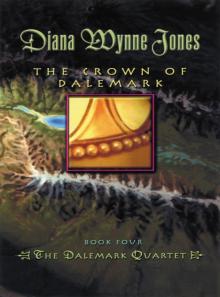 The Crown of Dalemark
The Crown of Dalemark Deep Secret
Deep Secret Witch Week
Witch Week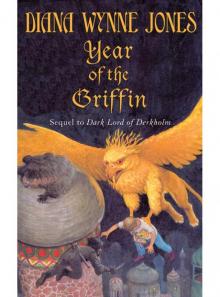 Year of the Griffin
Year of the Griffin Wild Robert
Wild Robert Earwig and the Witch
Earwig and the Witch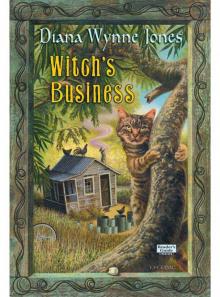 Witch's Business
Witch's Business Dogsbody
Dogsbody Caribbean Cruising
Caribbean Cruising Cart and Cwidder
Cart and Cwidder Conrad's Fate
Conrad's Fate Howl's Moving Castle
Howl's Moving Castle The Spellcoats
The Spellcoats The Pinhoe Egg
The Pinhoe Egg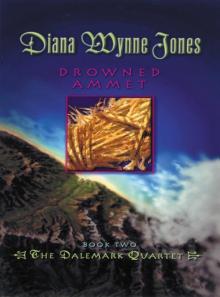 Drowned Ammet
Drowned Ammet The Ogre Downstairs
The Ogre Downstairs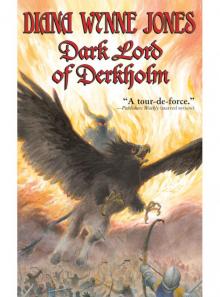 Dark Lord of Derkholm
Dark Lord of Derkholm Castle in the Air
Castle in the Air The Magicians of Caprona
The Magicians of Caprona A Tale of Time City
A Tale of Time City The Lives of Christopher Chant
The Lives of Christopher Chant The Magicians of Caprona (UK)
The Magicians of Caprona (UK)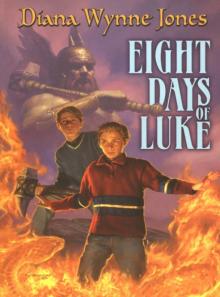 Eight Days of Luke
Eight Days of Luke Conrad's Fate (UK)
Conrad's Fate (UK) A Sudden Wild Magic
A Sudden Wild Magic Mixed Magics (UK)
Mixed Magics (UK)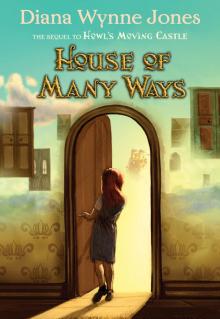 House of Many Ways
House of Many Ways Witch Week (UK)
Witch Week (UK) The Homeward Bounders
The Homeward Bounders The Merlin Conspiracy
The Merlin Conspiracy The Pinhoe Egg (UK)
The Pinhoe Egg (UK) The Time of the Ghost
The Time of the Ghost Hexwood
Hexwood Enchanted Glass
Enchanted Glass The Crown of Dalemark (UK)
The Crown of Dalemark (UK)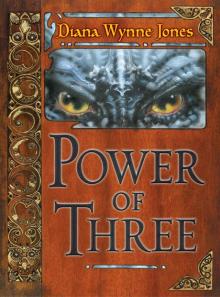 Power of Three
Power of Three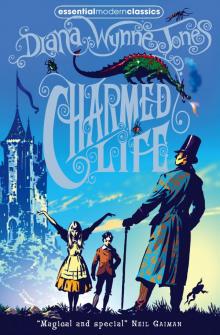 Charmed Life (UK)
Charmed Life (UK)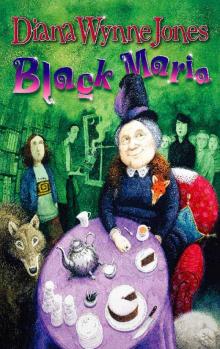 Black Maria
Black Maria The Islands of Chaldea
The Islands of Chaldea Cart and Cwidder (UK)
Cart and Cwidder (UK) Drowned Ammet (UK)
Drowned Ammet (UK) Charmed Life
Charmed Life The Spellcoats (UK)
The Spellcoats (UK)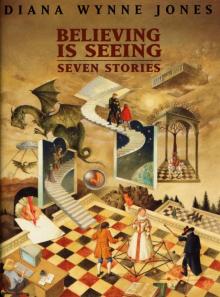 Believing Is Seeing
Believing Is Seeing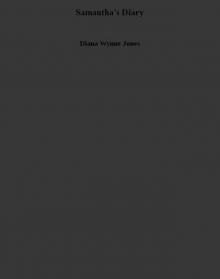 Samantha's Diary
Samantha's Diary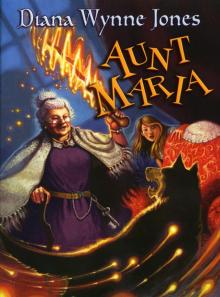 Aunt Maria
Aunt Maria Vile Visitors
Vile Visitors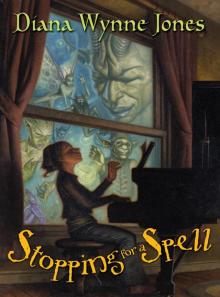 Stopping for a Spell
Stopping for a Spell Freaky Families
Freaky Families Unexpected Magic
Unexpected Magic Reflections
Reflections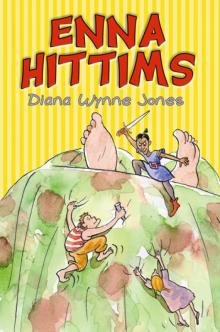 Enna Hittms
Enna Hittms Mixed Magics: Four Tales of Chrestomanci
Mixed Magics: Four Tales of Chrestomanci